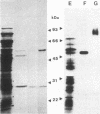Abstract
1-Aminocyclopropane-1-carboxylate (ACC) synthase (EC 4.4.1.14), extracted from tomato pericarp tissue, was purified 6500-fold by conventional and high-performance liquid chromatography. Two-dimensional gel electrophoresis of this preparation indicated that ACC synthase activity was associated with a protein band at 50 kDa, a value consistent with size determinations by gel filtration. Monoclonal antibodies against ACC synthase were obtained from murine hybridoma cell lines. These antibodies recognized the native enzyme, as shown with an immunoprecipitation assay. A monoclonal IgG immunoaffinity gel was used to isolate, from a relatively crude enzyme preparation, a single protein, which migrated at 50 kDa in a NaDodSO4/polyacrylamide gel. In vivo labeling of wounded tomato pericarp tissue with [35S]methionine followed by immunoaffinity purification of ACC synthase yielded a radioactive protein of 50 kDa. We conclude that the 50-kDa protein represents ACC synthase in extracts of wounded tomato pericarp tissue.
Keywords: tomato fruit development, enzyme regulation
Full text
PDF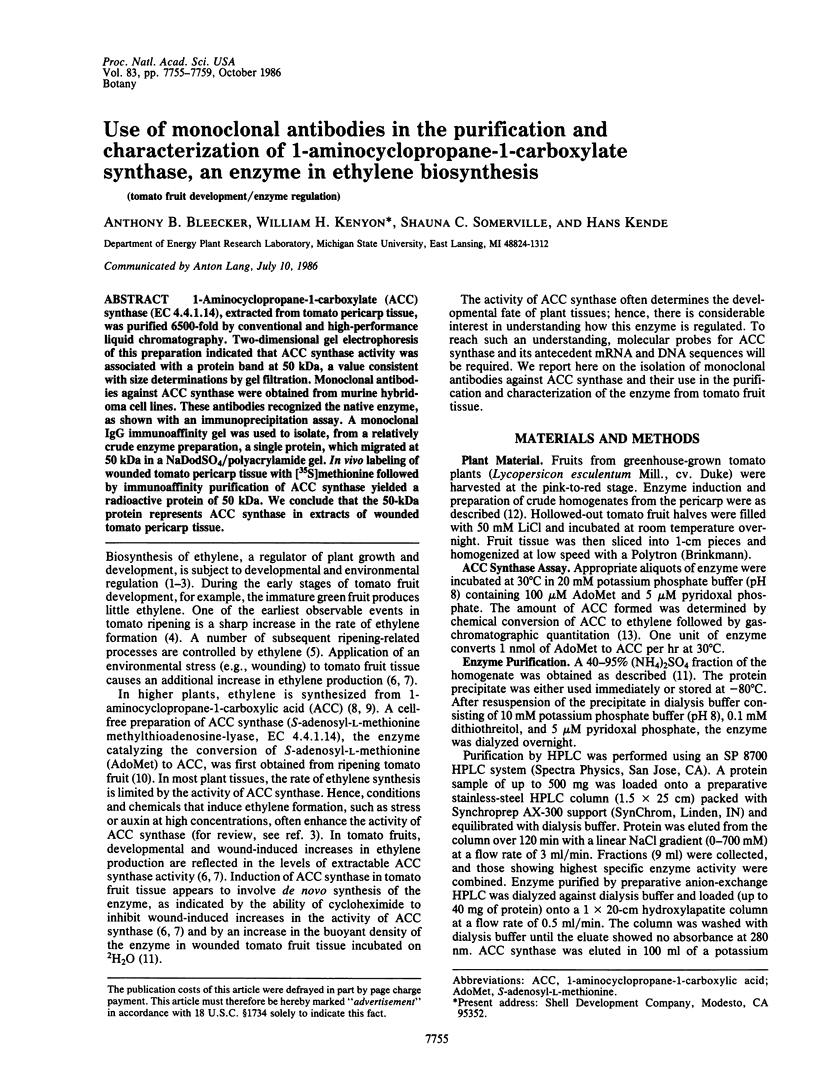
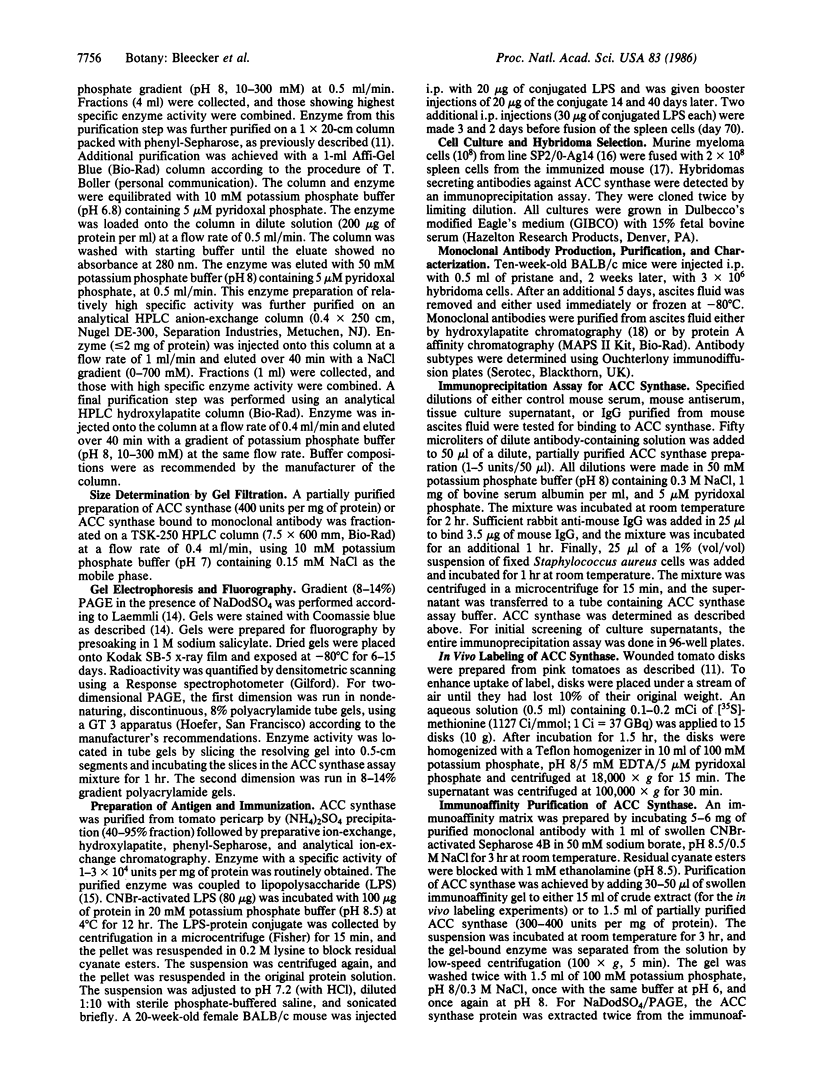
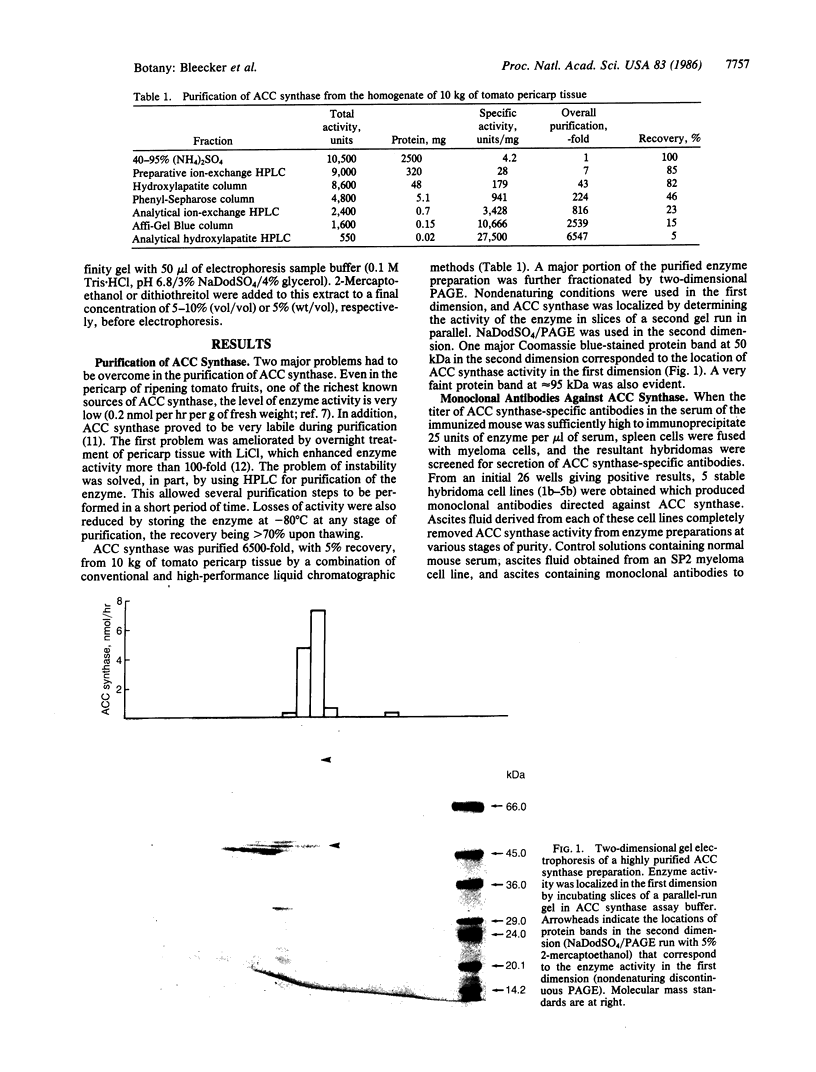

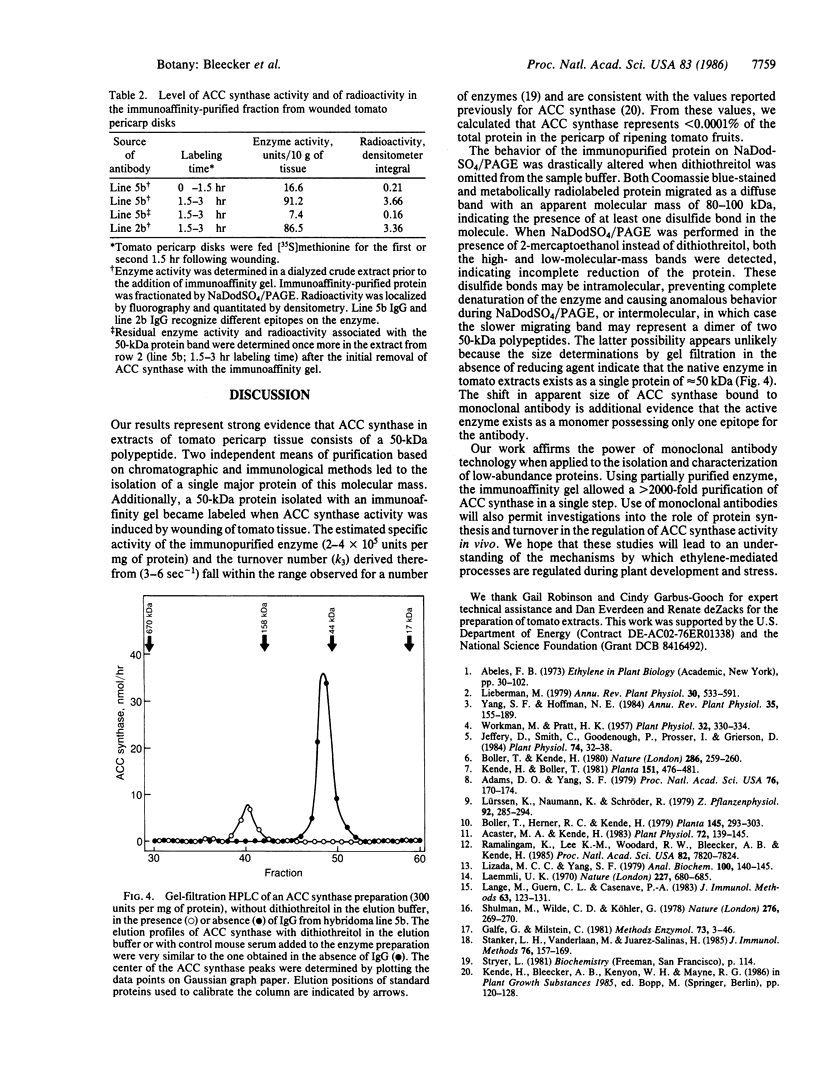
Images in this article
Selected References
These references are in PubMed. This may not be the complete list of references from this article.
- Acaster M. A., Kende H. Properties and Partial Purification of 1-Aminocyclopropane-1-carboxylate Synthase. Plant Physiol. 1983 May;72(1):139–145. doi: 10.1104/pp.72.1.139. [DOI] [PMC free article] [PubMed] [Google Scholar]
- Adams D. O., Yang S. F. Ethylene biosynthesis: Identification of 1-aminocyclopropane-1-carboxylic acid as an intermediate in the conversion of methionine to ethylene. Proc Natl Acad Sci U S A. 1979 Jan;76(1):170–174. doi: 10.1073/pnas.76.1.170. [DOI] [PMC free article] [PubMed] [Google Scholar]
- Galfrè G., Milstein C. Preparation of monoclonal antibodies: strategies and procedures. Methods Enzymol. 1981;73(Pt B):3–46. doi: 10.1016/0076-6879(81)73054-4. [DOI] [PubMed] [Google Scholar]
- Jeffery D., Smith C., Goodenough P., Prosser I., Grierson D. Ethylene-independent and ethylene-dependent biochemical changes in ripening tomatoes. Plant Physiol. 1984 Jan;74(1):32–38. doi: 10.1104/pp.74.1.32. [DOI] [PMC free article] [PubMed] [Google Scholar]
- Laemmli U. K. Cleavage of structural proteins during the assembly of the head of bacteriophage T4. Nature. 1970 Aug 15;227(5259):680–685. doi: 10.1038/227680a0. [DOI] [PubMed] [Google Scholar]
- Lange M., Le Guern C., Cazenave P. A. Covalent coupling of antigens to chemically activated lipopolysaccharide: a tool for in vivo and in vitro specific B cell stimulation. J Immunol Methods. 1983 Sep 30;63(1):123–131. doi: 10.1016/0022-1759(83)90215-6. [DOI] [PubMed] [Google Scholar]
- Lizada M. C., Yang S. F. A simple and sensitive assay for 1-aminocyclopropane-1-carboxylic acid. Anal Biochem. 1979 Nov 15;100(1):140–145. doi: 10.1016/0003-2697(79)90123-4. [DOI] [PubMed] [Google Scholar]
- Ramalingam K., Lee K. M., Woodard R. W., Bleecker A. B., Kende H. Stereochemical course of the reaction catalyzed by the pyridoxal phosphate-dependent enzyme 1-aminocyclopropane-1-carboxylate synthase. Proc Natl Acad Sci U S A. 1985 Dec;82(23):7820–7824. doi: 10.1073/pnas.82.23.7820. [DOI] [PMC free article] [PubMed] [Google Scholar]
- Shulman M., Wilde C. D., Köhler G. A better cell line for making hybridomas secreting specific antibodies. Nature. 1978 Nov 16;276(5685):269–270. doi: 10.1038/276269a0. [DOI] [PubMed] [Google Scholar]
- Stanker L. H., Vanderlaan M., Juarez-Salinas H. One-step purification of mouse monoclonal antibodies from ascites fluid by hydroxylapatite chromatography. J Immunol Methods. 1985 Jan 21;76(1):157–169. doi: 10.1016/0022-1759(85)90488-0. [DOI] [PubMed] [Google Scholar]
- Workman M., Pratt H. K. Studies on the Physiology of Tomato Fruits. II. Ethylene Production at 20 degrees C as Related to Respiration, Ripening, and Date of Harvest. Plant Physiol. 1957 Jul;32(4):330–334. doi: 10.1104/pp.32.4.330. [DOI] [PMC free article] [PubMed] [Google Scholar]




